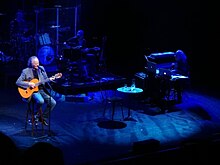Joan Manuel Serrat
Joan Manuel Serrat Teresa (Catalan pronunciation: [ʒuˈam mənuˈɛl səˈrat]; born 27 December 1943) is a Spanish musician, singer, and composer.
Serrat's lyrical style has been influenced by other poets such as Mario Benedetti, Antonio Machado, Miguel Hernández, Rafael Alberti, Federico García Lorca, Pablo Neruda, and León Felipe.
His father, Josep Serrat, was a Catalan anarchist affiliated with the CNT and his mother, Ángeles Teresa, a housewife, was from Belchite, Zaragoza in the region of Aragon.
In 1965, while singing in a radio show called Radioscope, host Salvador Escamilla helped him secure a record deal with local label Edigsa, from there joining the group Els Setze Jutges which defended the Catalan language during the Spanish State.
Joan Manuel Serrat's first live stage performance in 1967 at the Palau de la Música Catalana, served to establish him as one of the most important artists inside the Nova cançó movement in Catalonia.
This album brought him immediate fame in all Spain and Latin America though, in spite of this, his decision to sing in Spanish was criticized in some Catalan nationalist circles.
Around the same time, Cuban artists such as Silvio Rodríguez, Pablo Milanés, Chucho Valdés, and Ibrahim Ferrer came together to make another tribute CD, Cuba le canta a Serrat.
By 2006, the theater of the University of Puerto Rico in Río Piedras where Serrat sang in 1970 had undergone a multimillion-dollar renovation, after being closed for ten years.
Among the most noteworthy are Ahí te mando mi guitarra, Juan Manuel, composed by Manuel Alejandro and played by Blanca Villa while Serrat was in exile for his statements against the death penalty; the recent Maldito Serrat by the Argentine singer-songwriter Ignacio Copani; Mi primo el Nano, composed by his friend Joaquín Sabina, and the Canción para un maño, a song by Georges Brassens adapted by Paco Ibáñez.
These are the cases of Alberto Cortez in his live version of No soy de aquí, by Joaquín Sabina himself when he recorded No hago otra cosa que pensar en ti on the album Serrat, eres único, of Presuntos Implicados in "Ser de agua" or of singer-songwriters like Juan Carlos Baglietto, Fito Páez , Javier Ruibal, Víctor Heredia, Fernando Delgadillo, Ricardo Arjona, Amaury Pérez, Vicente Feliú, Alejandro Filio, Kiko Tovar, Cacho Duvanced, Ramiro Segrelles, Joan Isaac, Guillermina Motta, Gerardo Peña, Hernaldo Zúñiga, Liuba María Hevia, Alejandro Nardecchia, Miquel Pujadó, Joan Baptista Humet, among others.
You can also quote in this section the lyrics of Sóc el millor, which Francesc Pi de la Serra composed, although more than in homage was a harsh criticism towards Serrat for his decision of Joan Manuel to sing also in Spanish.
[5] In 1974, during a visit to Mexico, an arrest warrant was issued for Serrat in Spain after he criticised the death penalty and the "established and official violence" of the dictatorship of Francisco Franco.

